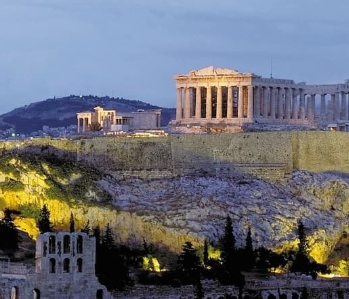Greece, a country that lies at the crossroads of Europe, Asia, and Africa, offers a remarkable mix of history, culture, and natural beauty. From the iconic ruins of Athens to the sparkling blue waters of the Cyclades, Greece is a destination that promises a diverse and enriching experience. With its ancient landmarks, sun-kissed islands, and delicious cuisine, Greece is a place where the past meets the present in the most captivating way.
The ideal time to visit Greece is during the spring (April to June) and fall (September to October). The weather during these months is mild and pleasant, perfect for sightseeing and beach activities without the overwhelming summer crowds. Summer is the peak season, especially for the islands, and while the weather is hotter, it also offers a lively atmosphere and a range of festivals and events.
Athens, the capital city, is the heart of Greece’s ancient civilization. Known for its iconic landmarks, Athens is home to the Acropolis, a UNESCO World Heritage site that includes the Parthenon, the Temple of Athena Nike, and the Erechtheion. These ancient ruins stand as a testament to the grandeur of classical Greece. Strolling through the Plaka neighborhood, you’ll find charming streets lined with cafes, shops, and traditional Greek tavernas. For a panoramic view of the city, climb to Lycabettus Hill, where you can take in the sweeping vista of Athens and its surrounding areas.
In addition to its historical significance, Athens is also a vibrant city, blending modern life with its ancient roots. The Syntagma Square, with its imposing government buildings, and the bustling Monastiraki flea market are a must-visit for anyone interested in the contemporary culture of the city. Don’t miss the opportunity to try local delicacies like souvlaki, moussaka, and baklava in one of the many restaurants or street vendors.
Greece is famous for its islands, each with its own unique character and charm. The Cyclades are the most famous, featuring whitewashed buildings with blue-domed churches, narrow cobbled streets, and crystal-clear waters. Santorini, with its breathtaking sunsets and stunning caldera views, is perhaps the most iconic of all. The island’s volcanic history has created dramatic cliffs and beaches with black, red, and white sand. Mykonos, known for its vibrant nightlife, beautiful beaches, and chic atmosphere, attracts visitors from around the globe. For a more tranquil experience, Naxos and Paros offer charming villages, scenic landscapes, and serene beaches.
Further north, the Ionian Islands offer a different kind of beauty, with lush green landscapes and a mix of Venetian and Greek architecture. Corfu is the most famous of these islands, known for its historic Old Town, beautiful beaches, and rich cultural heritage. The Peloponnese, a peninsula to the south of Athens, is a treasure trove of ancient ruins and natural beauty, with sites like Olympia, the birthplace of the Olympic Games, and the stunning Nafplio, a picturesque coastal town with charming streets and fortresses.
For nature enthusiasts, Greece offers many opportunities for hiking, exploring, and unwinding. Meteora, located in central Greece, is known for its awe-inspiring rock formations and monasteries perched high on the cliffs. Hiking through these landscapes offers a mix of natural beauty and cultural discovery. The Pindus Mountains in the northwest also offer scenic hiking trails, traditional villages, and remote monasteries, making it perfect for those looking to escape the crowds and experience the authentic Greek countryside.
Greek cuisine is a highlight of any trip, offering a wide array of fresh and flavorful dishes. Olives, cheese, and fresh seafood form the core of many Greek meals. Try the famous tzatziki, a yogurt and cucumber dip, along with dolmades, vine leaves stuffed with rice and herbs. For something heartier, indulge in souvlaki, grilled meat served on skewers, or moussaka, a baked dish made with layers of eggplant, minced meat, and béchamel sauce. Finish off your meal with a glass of ouzo, a traditional anise-flavored spirit, or raki, a popular drink on the islands.
Greece’s culture is also enriched by its festivals and traditions. The Athens and Epidaurus Festival celebrates Greek drama, dance, and music, often held in the ancient Epidaurus Theater. The Carnival of Patras, held in the coastal city of Patras, is one of the largest and most famous in Greece, known for its vibrant parades and street parties. On the islands, religious festivals like Easter are celebrated with fervor, marked by traditional ceremonies, feasts, and celebrations.
Getting around Greece is relatively easy, thanks to a well-established transportation network. The Greek islands are well-connected by ferries, and Athens is the hub for domestic flights to other parts of the country. The Athens Metro and buses make it simple to explore the city, and taxis are readily available. For those who wish to explore at their own pace, renting a car or scooter is a great way to see the more remote regions of the mainland and islands.
Greece offers something for everyone: history lovers can immerse themselves in ancient ruins, beach lovers can relax on some of the most beautiful shores in the world, and food lovers can indulge in some of the best Mediterranean cuisine. With its warm hospitality, stunning landscapes, and rich cultural heritage, Greece is a destination that will leave you with unforgettable memories. Whether you’re wandering through ancient ruins, lounging by the sea, or enjoying a lively festival, Greece is sure to capture your heart.





